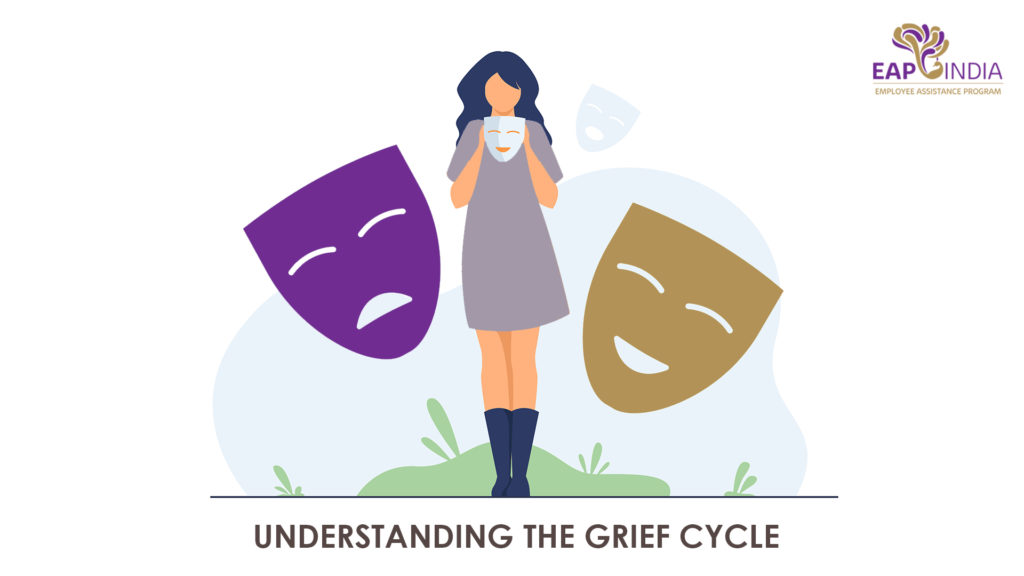Experiencing grief by losing a loved one or anyone you know closely is very personal and overwhelming. One of the most difficult things to accept is that grieving is a difficult process. The feelings associated with it also vary from person to person.
If you’re dealing with grief, it is important to understand that you will have many good days and many bad days. You will also feel your mood fluctuate from time to time. Your feelings are valid and you are allowed to be silent and it’s alright to grieve.
Important Things to Know About Grief
Emotions associated with grief, death and dying can range from anger to sadness. The symptoms can last for weeks, months and sometimes even a year or longer. Anxiety and depression are also natural emotional responses.
There are four types of grief:
- Anticipatory Grief: This type of grief can be complex, as seeing someone suffer & finally letting them go may kind of bring a relief that their suffering is over.
- Normal Grief: This type of grief is difficult to accept. From the outside, it may seem as if the person is not affected by it, but internally they go through pain, numbness and difficulty in moving on from the death.
- Complicated Grief: This type of grief is characterized by irrational thoughts and may also be expressed as avoidance behavior.
- Disenfranchised Grief: This type of grief may happen after losing a pet, a non-family member. This type of grief is not valued by the society.
The most troubling symptoms of grief are the emotional symptoms that occur. Some people who are grieving may express their feelings by crying and there might be others who may just sit in silence and ruminate.
The Grief Process
By Elizabeth Kubler-Ross (1969)
There are 5 stages of grief stated by Elizabeth Kubler-Ross in 1969 in her book “Death and Dying”. Each individual who is grieving goes through every stage but not necessarily in the same way the stages are being presented. The intensity of each stage also differs from person to person.
The stages are:
- Shock and Denial:
The first stage is shock and denial. In this stage, the expressions and feelings of experiencing loss are often profound. Some individual try to deny the reality that the person has died, they are in a constant state of denial. If the loss was unexpected, the person who is grieving may feel numb from the shock.
Symptoms in this stage include feeling paralyzed emotionally, difficulty in sleeping, poor appetite, increased heart rate. It feels as if they cannot wrap their head around the fact that their loved one is no more.
- Anger:
After the denial phase, many people start to exhibiting feelings of anger and frustration. There are times when an individual goes completely silent because of anger or go through a lot of frustration because of losing their loved one. When there is anger, there are also incidents when you blame others including the person who has died.
They may feel like they could have done something to prevent the event that caused grief from happening or feel regret from not being able to make peace with the loved one who has died. Feelings of remorse and pain are difficult to experience, but they are also very natural responses to grief.
- Bargaining:
Bargaining is often viewed as a bereaved person’s way of trying to prevent permanent loss by “making a deal with someone else”. Guilt is often accompanied with bargaining. Hopelessness and vulnerability are normal reaction often needed to regain control through a series of “if only” statements:
- If only we had sought medical attention sooner…
- If only we could have got a second opinion from another doctor…
- If only we had tried to be a better person towards them…
- Depression:
In this stage, the emotions may seem most raw. It is also very common that people may cry often. There might be seen a lot many changes in eating and sleeping patterns. The person who is grieving might begin to withdraw from others and would want to deal with the feelings of grief alone. Sadness and regret pre-dominate depression. There are times when people worry that, while experiencing grief; they might have spent less time with others who is dependent on them.
- Acceptance:
Acceptance is often confused with the notion of being “alright or OKAY” with what has happened. Acceptance stage just means to accept the reality that our loved one is physically gone and without them being physically present is the permanent reality. Many individuals do not have the energy to reach at this stage for the longest of times. This stage helps in coming to terms with the meaning that everyday will not be a happy day or you won’t experience grief ever again.
Conclusion
If grief is a process of healing, then depression is one of the many necessary steps along the way. While personal time for reflection is extremely important, it is also important to have a support system to lean on during this critical time. Spending time with friends or other family members can be helpful. Grief is a natural part of losing something or someone you held dearly, and it takes time.




